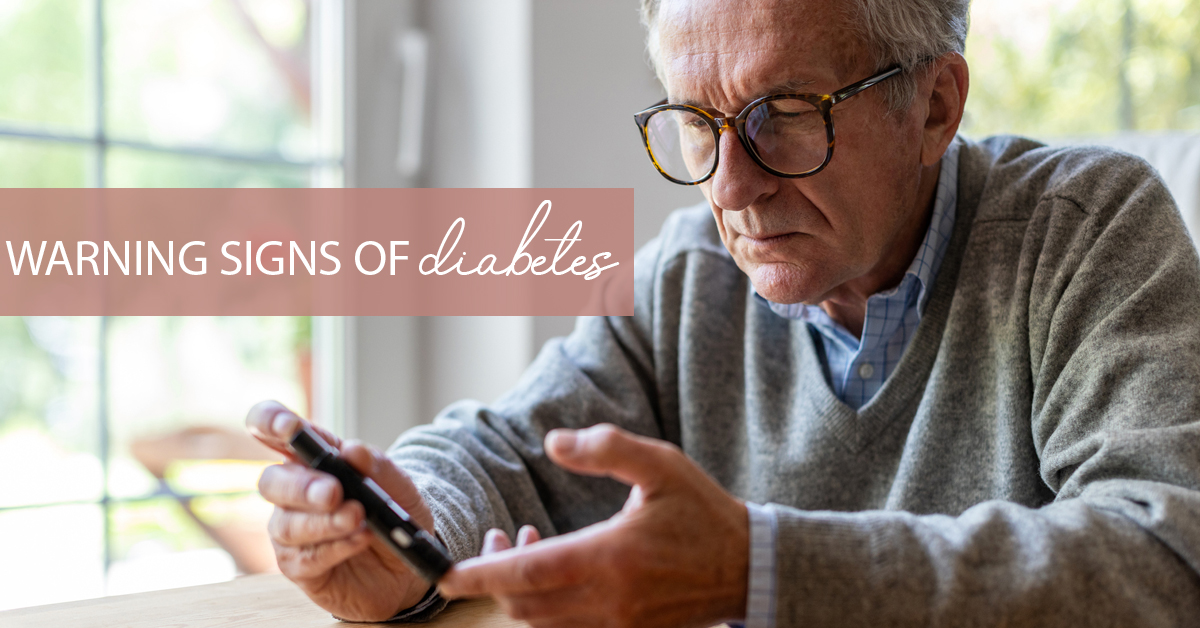
As of 2015, 30.3 million people in the United States, or 9.4 percent of the population, had diabetes. More than 1 in 4 of them did not know they had the disease. Diabetes affects 1 in 4 people over the age of 65. Early detection and treatment of diabetes is an important step toward keeping people with diabetes healthy and improving their quality of life. It can also help to reduce the risk of serious complications such as premature heart disease and stroke, blindness, limb amputations, and kidney failure.
Symptoms to be aware of:
Increased need to urinate:
Individuals with diabetes are unable to regulate blood sugar levels. When too much sugar is in your bloodstream, more fluids will pass through your kidneys. When there is too much glucose in the blood, the kidneys work overtime to flush it out of the blood via urination. So, you will find yourself needing to go to the bathroom more often than usual.
Increase in thirst:
Individuals with diabetes kidneys are forced to work overtime to filter and absorb excess glucose. When your kidneys can’t keep up, the excess glucose is excreted into your urine, dragging along fluids from your tissues, making you dehydrated and feeling thirsty all the time.
Blurry Vision:
Blurry vision is a telltale warning sign of diabetes. Your vision can get blurry because fluid is seeping into your eye. This can cause your eye lens to swell and possibly even changes its shape, which of course would make things a little bit more difficult to see. Eye damage is one of the major complications of diabetes. Diabetes can cause lasting retinal damage, but oftentimes it’s just a temporary, reversible symptom.
Tingling or Numbness in Your Hands or Feet:
We all get that pins and needles feeling when our foot has fallen asleep from sitting on it too long. But that numbness and tingling feeling is a little different when associated with diabetes. This feeling is called diabetic neuropathy, and it is a kind of nerve pain. The pain might start off as mild, but it can get worse over time, and it can spread up into your arms and legs. You might feel the effects of diabetic neuropathy in your hands, fingers, feet, and toes. It can also come with an aching, burning, sharp pain.
Even the simple act of walking can be extremely painful, and the lightest touch might be too much for you to bear. Almost 50% of diabetes sufferers will experience some nerve pain at some point in their life.
Crushing Fatigue:
Individuals with diabetes may feel foggy or groggy for several reasons, from dehydration to your body overall. When your body cannot use sugar properly for the energy you need, you feel tired. Fatigue is one of the primary symptoms of diabetes, and the fatigue associated with diabetes can make your daily activities seem like huge obstacles to overcome.
Unexplained Weight Loss:
Losing or gaining a few pounds occasionally is very normal. However significant weight loss or weight gain that happens unexpectedly could signal a serious health condition. For those who have diabetes, your cells have trouble getting glucose into them to use for energy. When this happens, your body reacts by burning fat and muscle for energy, causing you to lose weight unexpectedly and rapidly. Unexplained weight loss can occur in both type 1 and type 2 diabetes.
Reoccurring Yeast Infections:
If you grew up baking and remember that yeast feeds off sugar, it would kind of make sense why yeast infections would be common for those who are suffering from diabetes. Yeast lives naturally in us, but it can grow out of control in diabetes sufferers. If your diabetes is out of control, your blood sugar levels can shoot up to dangerously high levels. When sugar is in your bloodstream in high amounts, it can cause the yeast to grow out of control, especially in the vaginal area. Maintaining a healthy blood sugar level can reduce your risk of infection.
Wounds That Do Not Heal:
If you have ever noticed a pattern in your life, or over a recent period, of slow-healing wounds, it could be connected to diabetes. High blood sugar levels over time can have negative effects on the nerves and cause poor blood circulation. That makes it hard for blood –the necessary ingredient for skin repair itself, to reach parts of the body affected by wounds.
If these symptoms sound like what you are experiencing, do not wait to pick up the phone and schedule an appointment with your provider. Early detection for diabetes is key to reducing serious risks and side effects.



